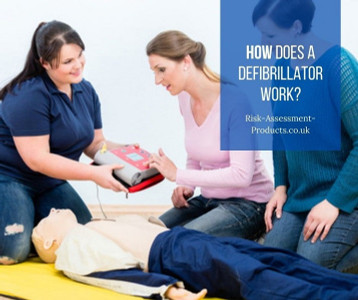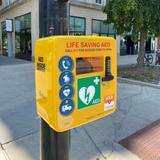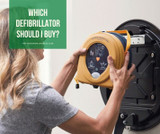How Does A Defibrillator Work?
A defibrillator is a medical device that is used when someone suffers a sudden cardiac arrest. They can be found in local towns and villages, offices, supermarkets, factories and sports venues across the country. If used within the first minute of someone falling ill, chances of survival when using a defibrillator can be as a high as 90%.
Being accessible and designed to be used by anyone, a defibrillator is someone’s best chance at survival until the emergency services arrive. Although there are more and more defibrillators being installed in venues across the country, thousands of people still don’t know what to do with a defibrillator or what they are used for.
To help with explaining this, at Risk Assessment Products, we have created a breakdown of what defibrillators do and how they work.
1. Are defibrillators easy to use?
Yes, defibrillators have been designed with ease of use in mind. As a cardiac arrest can happen to anyone at any time, it’s important to ensure anyone can use a defibrillator when necessary. This means that they have been developed to be used by anyone – medical professionals or lay people alike.
Defibrillators give real time feedback, have easy to follow steps and often have an audio feature which guides you through the entire process. This means that if someone nearby suffers a cardiac arrest, you do not have to wait for the paramedics to arrive, you can deliver life-saving care straight away.
2. Do defibrillators monitor heart rate?
When using a defibrillator, you will place the electrode pads on the patient’s chest which will be explained with audio and visual prompts. From here, the defibrillator scans the heartbeat to determine whether a shock is needed.
3. Do defibrillators determine whether a shock is required?
Yes, when scanning the heart (once the electrode pads have been applied to the chest), a defibrillator cleverly gathers information about the patients heart and will determine whether a shock is needed. Depending on whether you have an automatic external defibrillator or semi-automatic defibrillator will depend on whether you need to administer the shock (by simply pressing a button) or, whether the defibrillator will do this itself. Either way, the defibrillator will alert you about whether it needs to shock or not and will never provide a shock unless one is needed.
4. Do defibrillators deliver an electric shock?
Yes, defibrillators deliver an electric shock but only if needed. If a shock is going to be delivered, it will advise the user to stand aside for safety measures. When shocking a patients heart, the aim is to stop it so that it begins beating again itself at its natural pace.
Defibrillators have been developed over a number of years to be as compact and efficient as possible when it comes to saving the life of someone who is suffering a sudden cardiac arrest. Thanks to continuous research, there are many defibrillators on the market that are ideal for a range of environments from schools to office and sports facilities to factories. You can browse a wide range of defibrillators online to find the best solution for you.
Recent Posts
-
Empowering Communities: The Lifesaving Impact of CPR on Restart a Heart Day
Every year, on and around October 16th, an important event takes place - Restart a Heart Day. This a …16th Oct 2023 -
Which home defibrillator?
80% of all out of hospital cardiac arrests occur at home. Defibrillators are often available in loca …4th Dec 2022 -
Which defibrillator should I buy?
There are many defibrillators available on the market and it can become overwhelming knowing which o …4th Nov 2022




